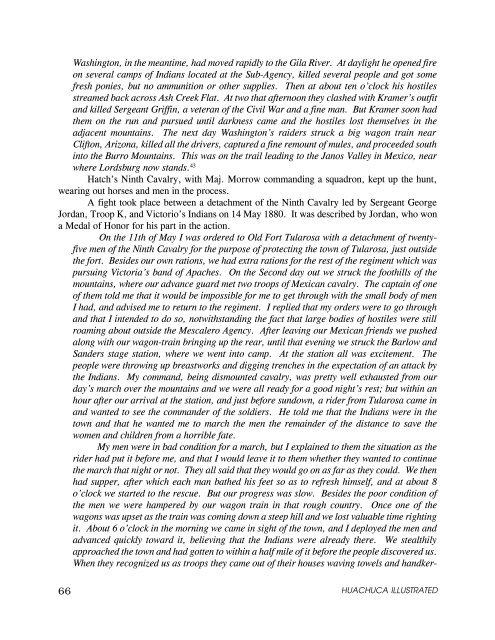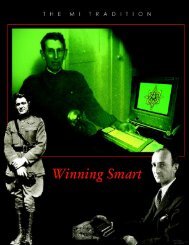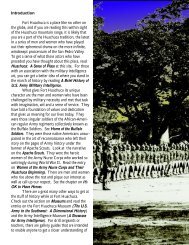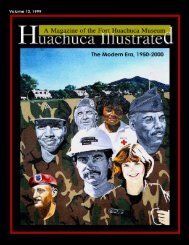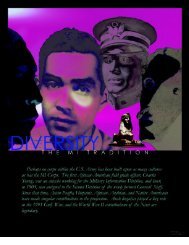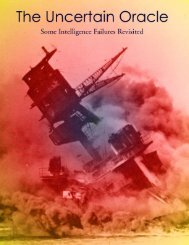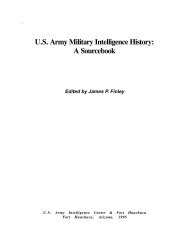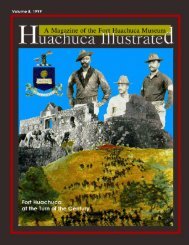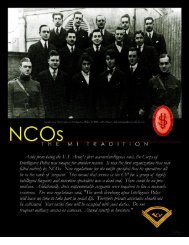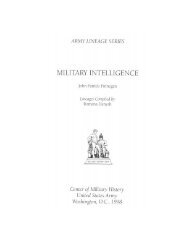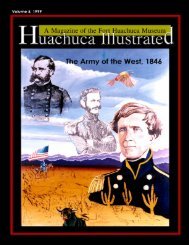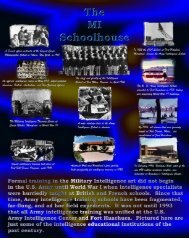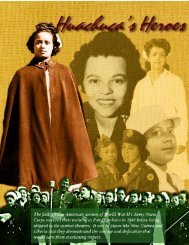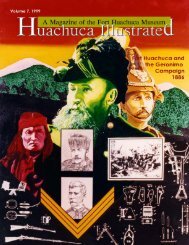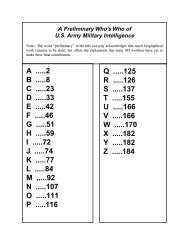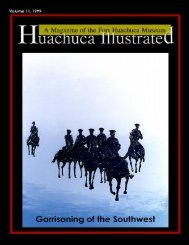Apache Campaigns - Fort Huachuca - U.S. Army
Apache Campaigns - Fort Huachuca - U.S. Army
Apache Campaigns - Fort Huachuca - U.S. Army
You also want an ePaper? Increase the reach of your titles
YUMPU automatically turns print PDFs into web optimized ePapers that Google loves.
Washington, in the meantime, had moved rapidly to the Gila River. At daylight he opened fire<br />
on several camps of Indians located at the Sub-Agency, killed several people and got some<br />
fresh ponies, but no ammunition or other supplies. Then at about ten o’clock his hostiles<br />
streamed back across Ash Creek Flat. At two that afternoon they clashed with Kramer’s outfit<br />
and killed Sergeant Griffin, a veteran of the Civil War and a fine man. But Kramer soon had<br />
them on the run and pursued until darkness came and the hostiles lost themselves in the<br />
adjacent mountains. The next day Washington’s raiders struck a big wagon train near<br />
Clifton, Arizona, killed all the drivers, captured a fine remount of mules, and proceeded south<br />
into the Burro Mountains. This was on the trail leading to the Janos Valley in Mexico, near<br />
where Lordsburg now stands. 43<br />
Hatch’s Ninth Cavalry, with Maj. Morrow commanding a squadron, kept up the hunt,<br />
wearing out horses and men in the process.<br />
A fight took place between a detachment of the Ninth Cavalry led by Sergeant George<br />
Jordan, Troop K, and Victorio’s Indians on 14 May 1880. It was described by Jordan, who won<br />
a Medal of Honor for his part in the action.<br />
On the 11th of May I was ordered to Old <strong>Fort</strong> Tularosa with a detachment of twentyfive<br />
men of the Ninth Cavalry for the purpose of protecting the town of Tularosa, just outside<br />
the fort. Besides our own rations, we had extra rations for the rest of the regiment which was<br />
pursuing Victoria’s band of <strong>Apache</strong>s. On the Second day out we struck the foothills of the<br />
mountains, where our advance guard met two troops of Mexican cavalry. The captain of one<br />
of them told me that it would be impossible for me to get through with the small body of men<br />
I had, and advised me to return to the regiment. I replied that my orders were to go through<br />
and that I intended to do so, notwithstanding the fact that large bodies of hostiles were still<br />
roaming about outside the Mescalero Agency. After leaving our Mexican friends we pushed<br />
along with our wagon-train bringing up the rear, until that evening we struck the Barlow and<br />
Sanders stage station, where we went into camp. At the station all was excitement. The<br />
people were throwing up breastworks and digging trenches in the expectation of an attack by<br />
the Indians. My command, being dismounted cavalry, was pretty well exhausted from our<br />
day’s march over the mountains and we were all ready for a good night’s rest; but within an<br />
hour after our arrival at the station, and just before sundown, a rider from Tularosa came in<br />
and wanted to see the commander of the soldiers. He told me that the Indians were in the<br />
town and that he wanted me to march the men the remainder of the distance to save the<br />
women and children from a horrible fate.<br />
My men were in bad condition for a march, but I explained to them the situation as the<br />
rider had put it before me, and that I would leave it to them whether they wanted to continue<br />
the march that night or not. They all said that they would go on as far as they could. We then<br />
had supper, after which each man bathed his feet so as to refresh himself, and at about 8<br />
o’clock we started to the rescue. But our progress was slow. Besides the poor condition of<br />
the men we were hampered by our wagon train in that rough country. Once one of the<br />
wagons was upset as the train was coming down a steep hill and we lost valuable time righting<br />
it. About 6 o’clock in the morning we came in sight of the town, and I deployed the men and<br />
advanced quickly toward it, believing that the Indians were already there. We stealthily<br />
approached the town and had gotten to within a half mile of it before the people discovered us.<br />
When they recognized us as troops they came out of their houses waving towels and handker-<br />
66<br />
HUACHUCA ILLUSTRATED


